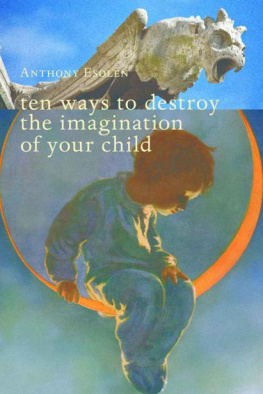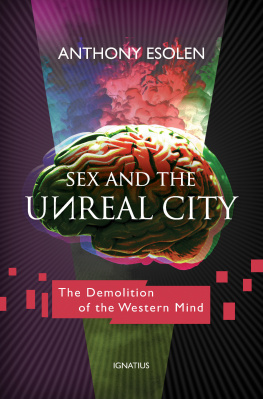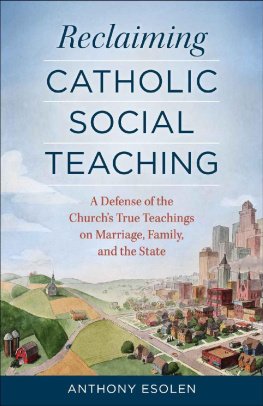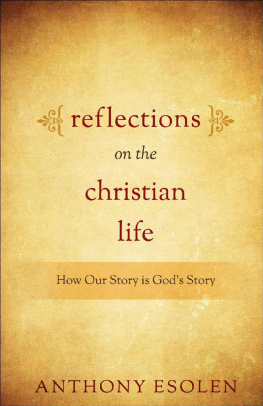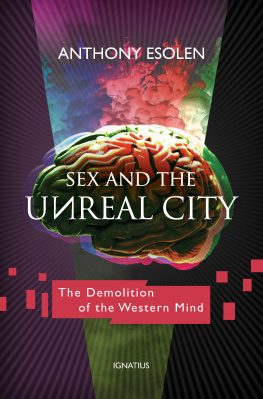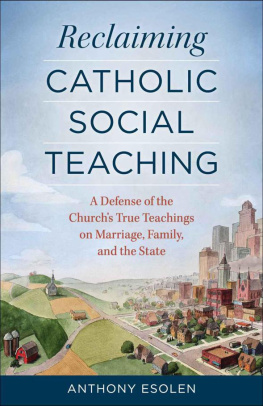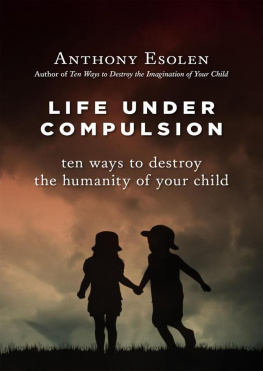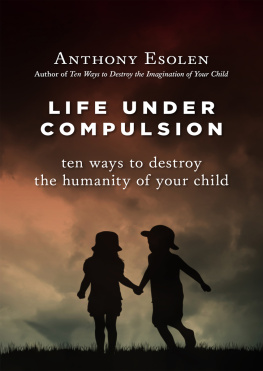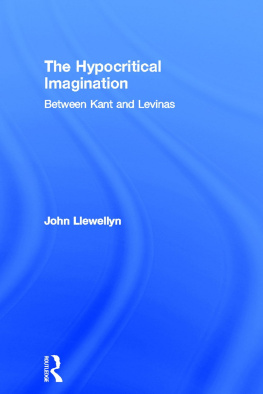Esolen - Ten Ways to Destroy the Imagination of Your Child
Here you can read online Esolen - Ten Ways to Destroy the Imagination of Your Child full text of the book (entire story) in english for free. Download pdf and epub, get meaning, cover and reviews about this ebook. year: 0, genre: Art. Description of the work, (preface) as well as reviews are available. Best literature library LitArk.com created for fans of good reading and offers a wide selection of genres:
Romance novel
Science fiction
Adventure
Detective
Science
History
Home and family
Prose
Art
Politics
Computer
Non-fiction
Religion
Business
Children
Humor
Choose a favorite category and find really read worthwhile books. Enjoy immersion in the world of imagination, feel the emotions of the characters or learn something new for yourself, make an fascinating discovery.
Ten Ways to Destroy the Imagination of Your Child: summary, description and annotation
We offer to read an annotation, description, summary or preface (depends on what the author of the book "Ten Ways to Destroy the Imagination of Your Child" wrote himself). If you haven't found the necessary information about the book — write in the comments, we will try to find it.
Esolen: author's other books
Who wrote Ten Ways to Destroy the Imagination of Your Child? Find out the surname, the name of the author of the book and a list of all author's works by series.
Ten Ways to Destroy the Imagination of Your Child — read online for free the complete book (whole text) full work
Below is the text of the book, divided by pages. System saving the place of the last page read, allows you to conveniently read the book "Ten Ways to Destroy the Imagination of Your Child" online for free, without having to search again every time where you left off. Put a bookmark, and you can go to the page where you finished reading at any time.
Font size:
Interval:
Bookmark:
ANTHONY ESOLEN

WILMINGTON, DELAWARE
Copyright 2010 by Anthony Esolen
All rights reserved. No part of this publication may be reproduced or transmitted in any form or by any means, electronic or mechanical, including photocopy, or any information storage and retrieval system now known or to be invented, without permission in writing from the publisher, except by a reviewer who wishes to quote brief passages in connection with a review written for inclusion in a magazine, newspaper, broadcast, or online publication.
Library of Congress Cataloguing-in-Publication data is on record and available upon request.
ISI Books
Intercollegiate Studies Institute
3901 Centerville Road
Wilmington, DE 19807-1938
www.isibooks.org
Manufactured in the United States of America
ISBN 978-1-61017-014-7 (electronic)
For my mother, Jane Esolen, who let me have a boys life.
Introduction
A Bad Day for Grendel
A Bad Day for Grendel
A few years ago, a vandal seized some forty or fifty thousand books from my college's library. He didn't want to read them, or even to sell them. He wanted simply to get rid of them, on the grounds that nobody would read them anyway. Some of the volumes he had branded for destruction were irreplaceable. I know, because I went into the back room where they were being held temporarily before the trucks came to haul them away. From that room I saved several dozen, including a definitive dictionary of medieval Latin, and the first great grammar book for Anglo-Saxonyou know, the language that Beowulf spoke on the night when he was tearing Grendel's arm off, and the monster knew that his end was near. That was not a good day for Grendel, says the poet, deadpan. It was not a good day for the books, either.
There wasn't much we could do about it, because the vandal in question made more money than we did and had a nicer office. He was our librarian. It's ironic, but true, that one of the qualifications of the modern librarian is a distaste for books. They take up space, and space, the librarians complain, is limited. The books grow old, too. Their covers fray, the spines crack, the pages go dog-eared. Inattentive student workers stick them on the wrong shelves, where they can practically disappear for years. People borrow them and don't return them. Some peopleI'm guilty of thisunderline favorite passages, or write wry comments in the margins, so that the book eventually becomes a kind of successive crime scene. Here a priest wrote, This is the modernist heresy all over again, but over there an infidel wrote, Church, enemy of thought. That is not to mention fingerprints and inkblots and even bloodstainsfrom crushed mosquitoes, I guess.
Books are bulky and inconvenientlike rocks, and trees, and rivers, and life. It occurs to me that everything that can be said against the inconvenience of books can be said about the inconvenience of children. They too take up space, are of no immediate practical use, are of interest to only a few people, and present all kinds of problems. They too must be warehoused efficiently, and brought with as little resistance as possible into the Digital Age.
And there is the trouble. A good book is a dangerous thing. In the wrong hands, it is like a bomb housed within a couple of red pasteboard covers. It can blow the world wide open; it can, if it's Dante's Divine Comedy , blow the reader as high as heaven. It carries within it the possibilityand it is always only a possibilityof cracking open the shell of routine that prevents us from seeing the world. Our days pass by with the regularity of a conveyor belt at an airport, which we duly get on, and make our way with bland uniformity. A book is like a mischievous boy sticking out his foot at the end of the belt, or like some fantastic intellectual machine that jolts us awake, and we find that the belt is gone. Instead, were riding in a stagecoach on a trail of dry ruts, and half-naked Indians are surrounding us from the hills, bows stretched and arrows picked to fly.
That's bad enough already. But children are worse than books. A book can make you see the world again, and so ruin your calm and efficient day. But a child does not need to see the world again. He is seeing it for the first time. The Gospel of John reports that when Jesus cured that blind man at the pool of Bethsaida, the people around him asked him what he saw. I see trees walking, he said, looking at the men and women. The child is like that, except that in his imagination the trees really do walk, and people really may grow branches. Tolkien's Ents, the tree-herders, are like slow, stately moss-grown ancient oaks and maples and birches, if oaks and maples and birches could talk; it takes them nearly a full day to say hello at their parliament. The old Greco-Roman myth had Apollo chasing the virgin nymph Diana, and just when he was about to catch her in his arms, her wish to escape him forever was granted, and she was transformed into a laurel tree. In the child's world, because it is a fresh and new world, anything may happen. The fat frog on the lily pad is a Buddha. The one-legged man stumping down the road to the nearest bar was once a pirate, and killed three people in a quarrel over a game of rummy. The house next door has eyes and a nose and a smokestack at the top. The girl who lives in it, the one with the yellow blouse, is an angel.
Obviously this won't do. If we believe what we say, that children are our greatest resource, then we need to do something about it. Resources are valuable because they are good, solid, dependable, and inert. Aluminum is a resource. Titanium is a resource. If a block of titanium were suddenly to say, No, I think I should not like to form an alloy with my friend aluminum to build the side of that airplane, and walked off the assembly line or the conveyor belt and bought a ticket on a ship to Athens, then it would no longer be a resource. In fact, it would be a positive danger. It would be worse than useless. It would be an Enemy of the People. Granite is a resource. If a block of granite at the top of an arch were to wriggle loose whenever people weren't around to notice, to drop on the head of the governor, we might swear off building with granite for a while. Or we might use it all the morebut that is another matter.
In order for children to be transmuted into resources, then, a tremendous alchemical change must be wrought in them. The old alchemists of the early Renaissance sought the secret philosopher's stone, which would, in the right recipe, transform lead into gold. We smile at their folly. We know full well that you can't transform lead into gold. You can only transform gold into lead. This book is written to show you how to do that. The gold is nothing other than the child's imagination, which if it is not gold itself, can still work the miracle of old King Midas. Nature only provides us with a leaden world, wrote the poet Philip Sidney, but it is the poet that makes for us a golden one. If we can but deaden the imagination, then, we can settle the child down, and make of him that solid, dependable, and inert space-filler in school and, later, a block of the great state pyramid.
But we don't want that! my reader objects. Yes, dear reader, you do. Children make liars of us all. Almost everything we say about them is a lie. We believe exactly the opposite, and act accordingly.
Suppose you are a lover of books. You will not say, Ah, books, yes, books are wonderful. Such treasures, books are! Myself, I don't have any, and I don't want any, or maybe just one, but I so love books! Why, you would have books strewn about your flat. You would delight in their very bindings and the smell of their pages. You would not know what to do without them. You would not say, Yes, I love books. That is why I have warehoused them in this special room, far away from company, and far from where I do anything of importance. I keep them locked up behind this glass case, and only take them out on special occasions. You would not say, Books indeed, our greatest resource. They kindle readily, and make excellent bonfires.
Font size:
Interval:
Bookmark:
Similar books «Ten Ways to Destroy the Imagination of Your Child»
Look at similar books to Ten Ways to Destroy the Imagination of Your Child. We have selected literature similar in name and meaning in the hope of providing readers with more options to find new, interesting, not yet read works.
Discussion, reviews of the book Ten Ways to Destroy the Imagination of Your Child and just readers' own opinions. Leave your comments, write what you think about the work, its meaning or the main characters. Specify what exactly you liked and what you didn't like, and why you think so.

